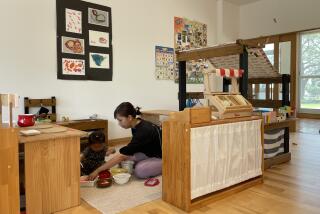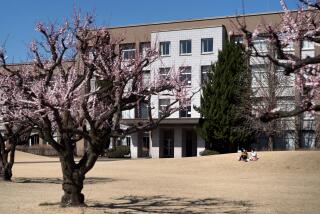For First Saturday in 120 Years, a Classless Society in Japan
- Share via
TOKYO — As Japanese schoolchildren took their first Saturday off in 120 years, ushering in a new era of more leisure for this nation’s “studyholics,” families seemed to deliver a split verdict: The kids loved it; their mothers didn’t.
“I’m glad the children can have a little more leisure in the mornings, but it means that I have to play with them all day,” said Hitomi Kojima, relaxing with her two children at Komazawa Olympic Park in western Tokyo.
But that’s just fine with her 7-year-old daughter, Rumi. Balancing precariously on a bicycle, the bright-eyed girl with the missing front tooth said she woke up at 6 a.m. Saturday and realized it was a day off. She promptly and happily went back to bed. She spent the day reading comics, playing with her computer and banging on her piano before going to the park with her mother and her 4-year-old brother, Tatsuya.
“I hope we can have every Saturday off,” she said. “School is boring.”
By 1994, Rumi may get her wish. The new five-day school week, aimed at giving children a respite from the long hours of study and frightful academic competition, is being slowly phased in with one Saturday off a month. Education Minister Kunio Hatoyama said he hopes to complete the transition in two years.
In anticipation of that change, the ministry has put 642 schools on an experimental program of every other Saturday off and is planning to study what problems surface, if any. Officials are particularly interested in how the study time lost on Saturdays is made up during the week and how the children spend their extra time.
But for the 18 million children in 47,000 public and private elementary, junior high and high schools who took Saturday off throughout Japan, even one extra holiday a month seemed a special treat. They sang karoke and played sports with their parents. At Komazawa Park, families picnicked under cherry trees and threw Frisbees. Proud parents videotaped their children on the slides and swings.
Leaving nothing to chance, 170 government, business and social organizations staged various events to fill the extra time if the children and parents couldn’t do it themselves. They offered workshops on everything from handicrafts to weeding gardens. Tours included fisheries, museums and libraries.
One thing the Education Ministry does not want children to do is study. It has asked the nation’s cram schools to refrain from Saturday classes, and most appeared to have complied.
Japanese children attend school 240 days a year, compared to about 180 days in the United States.
More to Read
Sign up for Essential California
The most important California stories and recommendations in your inbox every morning.
You may occasionally receive promotional content from the Los Angeles Times.














